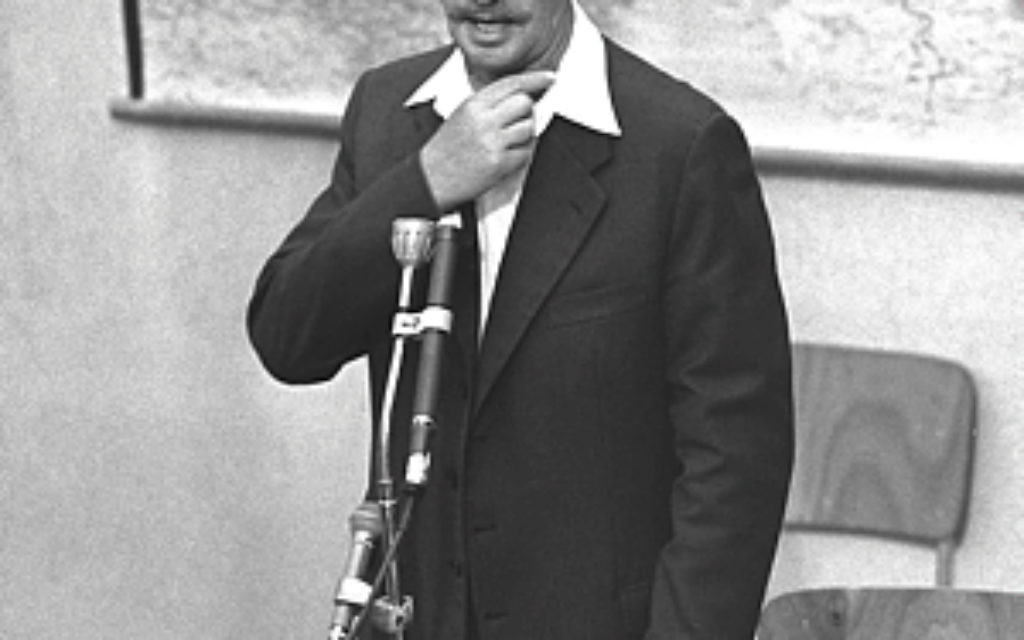Eichmann Trial Instilled Faith in Survivors
For Israel, Yom HaShoah and the legacy of the Holocaust are best articulated by a policy of “never again.”

On April 23, 1943, Mordechai Anielewicz, the commander of the Warsaw Ghetto uprising, penned his final letter.
He, along with other ghetto fighters, fell to Nazi forces May 8.
Anielewicz addressed the letter to Yitzhak Zuckerman, a clandestine operative on the Polish side of the ghetto. The letter describes the first few days of resistance fighting, expresses the need for weapons and articulates the dire conditions in the ghetto.
Get The AJT Newsletter by email and never miss our top stories Free Sign Up
Anielewicz concludes: “The dream of my life has risen to become fact. Self-defense in the ghetto will have been a reality. Jewish armed resistance and revenge are facts. I have been a witness to the magnificent, heroic fighting of Jewish men and women of battle.”
Anielewicz had been a leader in the Zionist youth group Hashomer Hatzair (the Youth Guard). After Germany invaded Poland, he tried to establish an escape route for Jews to Palestine through the Soviet Union, an effort stymied by Soviet authorities.
Zuckerman, known as Antek, not only was responsible for coordinating activities between the Jewish resistance and Polish underground, but also helped organize communication between isolated Polish Jewish communities and planned escape routes to Palestine.
Before the war, he was a leader in the He-Halutz movement, which trained Jewish youths for settlement in the land of Israel.
In December 1943, a group of Hashomer Hatzair members established a kibbutz named after Anielewicz near Ashkelon: Yad Mordechai (Memorial to Mordechai). The kibbutz would be the sight of a prolonged battle between Egyptian forces and two Palmach units in June 1948. Although Yad Mordechai eventually fell to the Egyptians, it would be recaptured during Operation Yoav in October 1948.
After surviving the war, Zuckerman made aliyah in 1947 and was among the founders of Kibbutz Lohamei Hagetaot (the Ghetto Fighters) near Akko in 1949.
On May 3, 1961, Zuckerman served as a witness during the Adolf Eichmann trial in Jerusalem. As part of his testimony, Zuckerman read Anielewicz’s letter of April 23, 1943.
The story of the Ghetto uprising and the events of the Eichmann trial significantly shifted Israeli public opinion on the Holocaust and about Shoah survivors in Israel.
In 1951, when Israel was selecting a date for Yom HaShoah, Holocaust Remembrance Day, many leaders wanted to anchor the day of remembrance to the Warsaw Ghetto uprising. Rather than focus on Jewish victimhood, these Israelis preferred to shine a spotlight on Jews who engaged in resistance.
That is but one example of Israel’s early reluctance to embrace the Holocaust as part of the new nation’s collective memory and experience. Many survivors experienced poor treatment and contempt at the hands of native-born Israelis and veterans who had arrived in the early years of the Yishuv.
The commemoration day that became Yom HaShoah was originally called Yom Hazikaron la Shoah Ve-Mered Hagetaot (Holocaust and Ghetto Revolt Memorial Day).
Each year on 27 Nisan, we pause and remember the tragic destruction of European Jewry during the Holocaust. These events — the Holocaust and memorialization — draw important connections with the Jewish state.
For Israel, Yom HaShoah and the legacy of the Holocaust are best articulated by a policy of “never again.” In other words, part of the country’s very fabric is to ensure that, by expressing Jewish sovereignty, the Jewish people will never again be forced to rely on others for security and existence.
Rich Walter is the associate director for Israel education at the Center for Israel Education.




comments